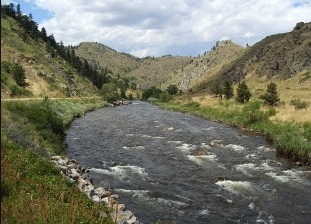COGA CEO Tisha Schuller supports front group claim that trees cause smog
Colorado Oil and Gas Association CEO Tisha Schuller said she wanted to depolarize the debate around fracking and drilling, and even said she’d be touring Colorado communities to do just that. So it was disappointing, if not surprising, when her group helped publicize industry front group Energy In Depth’s (EID) attacks on Denver Post reporter Bruce Finley. Finley came under fire from EID for his story on new requirements for companies surveying for oil and gas on residents’ land and for shining a light on industry propaganda. The EID piece went so far as to contend that trees cause smog. Rather than seize the opportunity to help set the record straight about the negative effects of oil and gas, Schuller’s group tweeted her support of EID’s lies. If Schuller truly wants to help depolarize the debate, she’ll distance herself from EID.
Association CEO Tisha Schuller said she wanted to depolarize the debate around fracking and drilling, and even said she’d be touring Colorado communities to do just that. So it was disappointing, if not surprising, when her group helped publicize industry front group Energy In Depth’s (EID) attacks on Denver Post reporter Bruce Finley. Finley came under fire from EID for his story on new requirements for companies surveying for oil and gas on residents’ land and for shining a light on industry propaganda. The EID piece went so far as to contend that trees cause smog. Rather than seize the opportunity to help set the record straight about the negative effects of oil and gas, Schuller’s group tweeted her support of EID’s lies. If Schuller truly wants to help depolarize the debate, she’ll distance herself from EID.
Group tours Dinosaur National Park to discuss proposed drilling
As concerned parties wait to learn whether or not Colorado BLM Director Helen Hankins will again try to lease land next to Dinosaur National Park’s visitor center for oil and gas drilling, Colorado Senator Michael Bennet brought together industry, politicians experts, including Park Ranger Jim Gale, to discuss the project on a two-day river trip through Dinosaur National Park. Others on the trip included: Colorado State Senator Gail Schwartz and a representative from the water commission. Gale blogged on the impact their surroundings’ beauty had on the entire group. But, questions remain about the fate of the park and whether the Colorado BLM is up to the task of balancing protecting the park with oil and gas development.
Water shortages among top concerns in Colorado
This week The Coloradoan asked five people—experts, an activist, and politicians—their views on the greatest environmental threats t o the state. Climate change, water shortages, air and water quality and the expansion of oil and gas were top environmental concerns.
o the state. Climate change, water shortages, air and water quality and the expansion of oil and gas were top environmental concerns.
Despite the group’s concerns, surprisingly most believed there were steps Coloradoans and the state could take to lessen the effect of environmental threats. Solutions ranged from greater protection of rivers, Coloradoans making their views known during elections, water conservation, and better oil and gas regulation.
Oil and gas royalty rates from the 1920s shortchange taxpayers
In a recent The Hill op-ed, Jim Baca, highlighted the up to hundreds of millions of dollars taxpayers are losing out on due to oil and gas onsho re royalty rates that have not been updated since the 1920s when Woodrow Wilson was president. Citing data from the Center for Western Priorities’ (CWP) recent report, “A Fair Share: The Case for Updating Federal Royalties,” Baca writes that the federal government is required to evenly split royalty revenue with states where oil is produced. Yet, the federal government charges oil and gas companies only 12.5 percent, lower than the 16.67 percent to 25 percent charged by the energy-rich states Colorado, Montana, New Mexico, Utah, and Wyoming. These states are losing out on an estimated $400-$600 million dollars in revenue as a result of the government’s undercharging, the report says.
re royalty rates that have not been updated since the 1920s when Woodrow Wilson was president. Citing data from the Center for Western Priorities’ (CWP) recent report, “A Fair Share: The Case for Updating Federal Royalties,” Baca writes that the federal government is required to evenly split royalty revenue with states where oil is produced. Yet, the federal government charges oil and gas companies only 12.5 percent, lower than the 16.67 percent to 25 percent charged by the energy-rich states Colorado, Montana, New Mexico, Utah, and Wyoming. These states are losing out on an estimated $400-$600 million dollars in revenue as a result of the government’s undercharging, the report says.
According to President Obama’s estimates, over the next 10 years updating the onshore royalty rate would generate $2.5 billion in net profit for the U.S. Treasury.
And, the good news is the Department of the Interior has the authority to raise the onshore rate to one that’s fair to taxpayers. It wouldn’t be the first time the agency raised rates, having previously raised the offshore rate from 12.75 percent to 18.75 percent under the Bush Administration.
With the President estimating an economic boost in the billions and the Department of the Interior having the power to do so, it’s time to charge a rate that’s fair to states and to taxpayers.
Cornell Professor and oil and gas engineer: gas is not “clean”
In a recent New York Times op-ed, Cornell Professor Anthony Ingraffea discussed the negative impact of gas-produced methane on our air and water and says that if we really want to address climate change, as outlined in President Obama’s recent speech, we’ll support the scaling of renewables such as solar. However, he adds that support for renewables needs to be coupled with policies that recognize the threat from oil and gas leaks and emissions.






Recent Comments